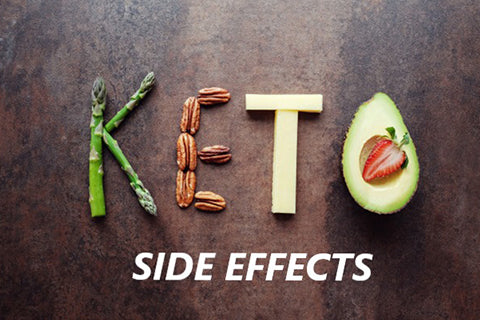
Must To Know Top 7 Side-Effects Of Keto-Diet

T
he Keto diet has emerged as the celebrated diet plan during the last decade mainly because of its short-term weight loss results. Prior to the discovery of insulin, the ketogenic diet was one assured hope of treating diabetes, it was also the successful diet pattern followed for treating people with epilepsy. Well, as times have passed by, Keto diet has become the popular diet plan for helping the epidemic of obesity.

While there isn’t sufficient evidence on the real successful benefits of Keto diet in promoting weight loss, Keto diet advocates feed the social media with before and after photos, crediting the diet or I must say over-exaggerating the diet as though it promotes life-altering weight loss!
The social media, magazines, and fitness blogs are all emphasizing the weight loss benefits of Keto diet, but the downsides of this diet pattern are usually minimized.
What Is A Keto Diet?
A Keto diet is a diet that includes high-fat, moderate proteins, and very low carbohydrates. The dietary macronutrients are divided into approximately 55% to 60% fat, 30% to 35% protein, and 5% to 10% carbohydrates respectively. If you intake a 2000 Kcal diet per day, carbs amount up to 20 to 50g per day.
How Does Keto Diet Work For Weight Loss?
The essence of Keto diet lies in lowering carb intake. We must understand here what happens to our body when we reduce carb intake.
As you know, insulin is a carb-specific hormone, when you reduce your carb intake to less than 50g/day, insulin secretion is significantly reduced and the body enters a catabolic state. When we stop/minimize feeding our body with carbs, our body depends on glycogen stores for energy, once after it gets depleted, it forces the body to switch through gluconeogenesis and ketosis for energy.

Gluconeogenesis is the endogenous production of glucose in the body, primarily from lactic acid, glycerol, and amino acids. Once glucose availability further drops, that’s when our body can’t keep up on the production of glucose and ketosis begins in order to provide an alternate source of energy in the form of ketone bodies which replace glucose as the primary source of energy.
During ketogenesis due to low blood glucose levels, the stimulus for insulin secretion is low, which reduces the stimulus for fat and glucose storage.
It is assumed that, when a person sets out to lose weight, it’ll be a whole new level of self-restraint, Keto diet can take this restraint to the next level…
TOP 7 SIDE EFFECTS OF KETO-DIET
KETO FLU

Going too low on carbs, as you already learned will lower your blood glucose level, the state which we term as hypoglycemia. When you turn to fat for fuel, you lose more water and electrolytes in your urine as a result of a decrease in the body’s insulin levels and a loss of muscle glycogen. The result of your body transitioning to fats as the main fuel can bring in a cluster of uncomfortable symptoms like headache, vomiting, diarrhea, constipation, nausea, muscle aches, general weakness. You may start feeling moody or uneasy as your body may not be getting carbs needed to produce serotonin, a neurotransmitter that regulates mood, appetite. Due to lowered secretion of serotonin, you may be prone to disordered eating patterns like binge eating. You may also experience carb cravings due to the body’s response to a lack of carbs.
CONSTIPATION / DIARRHEA

Going too low on carbs means setting aside high-fiber foods like whole grains, beans, fruits, and certain veggies. Constipation issue arises as a result of your body’s reaction to the new diet pattern. A drastic change in your diet can pose stress on your GI tract, your bowel movement decreases as a result of lack of fiber content in food. Moreover, Keto diet is a diuretic, which is another contributing reason for constipation.
Some may experience diarrhea while following a Keto diet. This is because when you eat food with fat, your liver releases bile into the digestive system to help break it down. Following a Keto diet means that the liver needs to release extra bile. Bile is a natural laxative, so much secretion can loosen stool and speed up how fast it moves through your system. Diarrhea could also result due to intolerance to dairy or foods you might be eating more of by switching to a high fat, low-carb lifestyle.
KETO-BREATH

When your body enters ketosis, the ketones will produce acetone (one of the ketones that the liver produces as a result of fat metabolism). The ketones will circulate in your body and your body will exhale these ketones to avoid build-up in your bloodstream. When ketones diffuse into your lungs and appear in your exhaled breath, it imparts a distinct fishy odour to your breath.
KETOACIDOSIS

Ketosis can cause ketoacidosis which could turn out to be dangerous in long term. When your body stores up too many ketones as a byproduct of breaking down fat, then chances are your blood becomes too acidic. This condition may cause a threat to your liver, kidneys, and brain.
Ketoacidosis may also cause dry mouth, frequent urination, nausea, and breathing difficulties.
WEAKENED IMMUNE SYSTEM

Keto diet can disrupt the balance of good and bad bacteria in your GI tract. While on a Keto diet, you are supposed to take unsaturated fat (fat from a good fat source). High saturated fat, or unhealthy fat intake, and eating less fiber can decrease probiotic bacteria. Since the immune system starts in our gut, the gut imbalance can impact brain health, immune health, and the onset of diseases. The research on ketogenic diets also suggests you’ll need to take probiotics and multivitamin supplements to protect gut health and support the immune system.
FATIGUE

Fatigue may be another unpleasant side effects of Keto diet. Carbs are stored in the body in the form of glycogen along with water. When you burn those stored carbs, excess water gets flushed out in your urine. Sodium helps the body retain water and maintain fluid balance in the body. Loss of water means, electrolytes like sodium, potassium get flushed out too. Electrolytes help conduct nerve impulses, maintain muscle function and pH balance in the body. Loss of electrolytes causes heart palpitations, muscle cramps, fatigue, cognitive distortions, dizziness, leg cramps, sleep disorders.
EMOTIONAL EXHAUSTION

Food we eat plays a role more than just filling our stomach, it helps create an emotional satisfaction. Restricting a particular food group can be easier for short term but can turn out to be daunting in the long term. Most people who embark on Keto diet wind up and decide not to continue on it sooner because of the emotional consequences. Going too low on carbs will make you quit eating pizza, cupcakes, ice-creams, beans fry, sweet potatoes, and your much loved water-melon. Being on such restrictive diet can make you not keep up with the diet and return to the previous eating habits which can trigger feelings of guilt and failure in you.
*We don’t intend to promote or demote people following any particular diet pattern. It is advisable to kindly consult a dietitian or a doctor before jumping into a new diet pattern.
The best approach to food intake is one in which you are healthy and nurtured and matches your social and cultural preference...
Energy in minus energy out is the ultimate formula for weight loss, you can absolutely lose weight on any diet if you follow this formula…
Also Read: Low-Carb Diet for weight loss - How does it work?
 Follow our Instagram page for the latest updates: badalkhudko
Follow our Instagram page for the latest updates: badalkhudko




Comments
Leave a comment